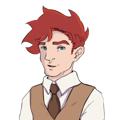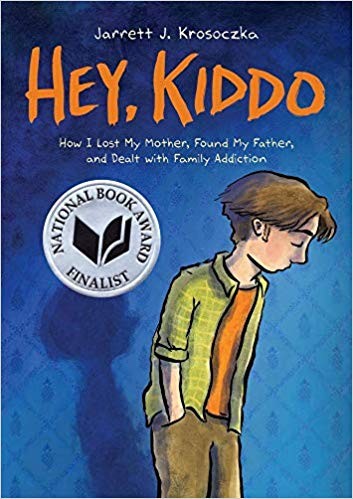Literally Graphic reviewed Hey, kiddo by Jarrett Krosoczka
A Middle Grade Comic About Family & Substance Use
4 stars
Today's pick is Hey, Kiddo: How I Lost My Mother, Found My Father, and Dealt with Family Addiction by Jarrett J. Krosoczka. Published by Scholastic's Graphix imprint in 2018.
This volume is rated for 12 and up by scholastic and seems shelved in middle grade generally.
Content notes for smoking, problematic substance use, abuse, nightmares, bullying, monsters, teen drinking, and the f-slur.
This book has been on my radar for some time now and my interest in better/more realistic/harm reduction perspective on substance use (particularly for young people) was a big part of why I picked it up. Did it live up to these hopes? Keep watching to find out my opinion, with the caveat that a lot of personal stuff came up since I read this book so it's been a minute since I actually read this book but I'm hoping my notes will be thorough enough.
The summary on goodreads is "In kindergarten, Jarrett Krosoczka's teacher asks him to draw his family, with a mommy and a daddy. But Jarrett's family is much more complicated than that. His mom is an addict, in and out of rehab, and in and out of Jarrett's life. His father is a mystery -- Jarrett doesn't know where to find him, or even what his name is. Jarrett lives with his grandparents -- two very loud, very loving, very opinionated people who had thought they were through with raising children until Jarrett came along. Jarrett goes through his childhood trying to make his non-normal life as normal as possible, finding a way to express himself through drawing even as so little is being said to him about what's going on. Only as a teenager can Jarrett begin to piece together the truth of his family, reckoning with his mother and tracking down his father."
As a memoir obviously talking about the book also creeps in on talking about the creator's bio... Browsing his portfolio website's about page we also learn that Jarrett is apparently known as JJK. He's the author/illustrator of forty plus books for young readers. And he "produced, directed and performed in the full-cast audiobook adaption of his graphic novels."
Jumping to the artwork side of things. We have what has become a pretty classic graphic memoir look that I find pretty attractive. I'm not sure if it comes across as derivative to anyone, but I particularly appreciate how this sort of style is a balance of things looking realistic and expressive. Which is generally a fitting tone for this sort of story. The page layouts are also very well done, with enough diversity to keep your attention but not confusingly so. We even get a light splash of mixed media.
Zooming out to look at the writing side of things overall, as a middle grade graphic novel Hey, Kiddo does a very good job (in my humble opinion) of looking at many adult problems and the choices of the adults in your life from the perspective of a child. A perspective with, at times, limited understanding and characterized by a distinct lack of autonomy. I would also note that besides the obvious focus on substance use, there's also a clear effort to highlight and explore the implications of being raised by one's aging grandparents. There's a lot of love, but also physical limitations and complicated relationships between parents who can't be there and their parents who were probably not expecting to raise a second generation. And in this case, have problems of their own. Big points to the grandparents who supported Jarrett's interest in art though!
But yeah, substance use... Before we go any further I would say that this is JJK's story and to a large extent he gets to tell it the way he wants to and while I will go on a bit of a tangent about my ideals around the representations of substance use, this is not a critique of JJK. Not to mention that my own thoughts as someone without any meaningful lived experience, limited further by the time and place I exist in, are certainly not above critique/aging poorly. It's also true that as a nonfiction work, Hey, Kiddo is also limited by the fact that it's going to have to depict someone with "problematic substance use" being treated in the way that they were treated, which is guaranteed to be less then the ideal ways that the community I am currently aware of is asking to be treated.
For one thing, Ja's mother's substance use (and honestly that of his grandmother) are both problematic and damaging to their lives. Supports such as legal and safe supply, destigmatizing substance use, housing first and therapy can change substance use that is detrimental to a person's life to a life with or without substances that is safe and accepted/integrated into wider society. And there are actually plenty of people who do live like this already, namely using substances (legal and illegal) who are not doing damage to themselves or others, but they don't generally have stories written about them because it's not nearly as exciting. Even JJK's grandmother's alcoholism is more accepted and integrated because her substance use is at least legal and much more accepted. Although it still has a negative impact on those around her, because despite all the harm reduction measures around alcohol consumption it's still arguably a more damaging substance then many. And she clearly needs some mental health supports. People generally start using substances (from coffee to pain medication to meth) because it helps them overcome a problem they are experiencing or because it simply helps them feel normal.
And, to continue with my little soap box speech here, people are being left to die by the current war on drugs in both so called canada and in the so called united states because they are seen as sub-human and expendable.
Practically speaking, there are very simple steps that are proven to help right here and right now. This includes distribution of clean supplies such as needles, pipes, cookers and sterile water etc, supervised consumption sites, and safe supply - like we have for alcohol and prescription medication. These measures help keep people healthier and alive as they are ideally connected with their needs.
I could go on further but I want to release this video some time this century. I would highly highly highly recommend that everyone check out the crackdown podcast as it does a much better and more sustained job of looking at the state of the war on drugs from the front lines.
Moving along to the other kinds of representation that I try to highlight in each of my reviews:
Looking at how gender is represented in Hey, Kiddo. Very binary, I appreciated the way that we got a realistically nuanced view of how men can be good caretakers of children. Something I feel like I still see much more frequently in real life then in literature. In contrast, adult of both binary genders do let JJK down at one point or another.
Sexuality was not an explicit focus of the book, but was understandably fairly heteronormative in the kinds of families and relationships JJK was apparently exposed to during this time. Although that doesn't save us from the f-slur. Sigh. And a lot of heterosexual reproduction.
Class felt like it was there but strangely obfuscated. Probably it's just downplayed, like most none materialist writers tend to do.
I feel like there's a tad bit of racial diversity, but I might be misremembering and it's certainly not a focus.
Wrapping things up, I think this book was good. It's very skillfully put together and sets the bar higher for me in several ways. Four stars. I've found at least one more book to pick up next that seems to tackle a similar story, but as usual I'm open to any and all suggestions from y'all.

